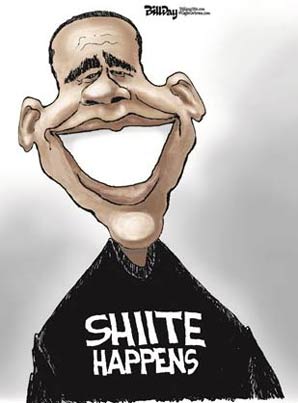
President Obama is on his way out, and not a minute too soon. The legacy he obsesses over continues to expand in revealing ways. It may not be exactly what he thinks he's leaving, and it's more legacy than he wants.
The terrorists of ISIS, whom the president witlessly derided as "the junior varsity," a ragtime army not bad enough to worry about, have metastasized throughout the Middle East and Europe on his watch, and may be coming soon to a neighborhood near you.
ISIS and other terrorist groups have largely abandoned attempts to put together spectaculars like September 11, and are focusing now on "a new landscape," where lone killers, empowered by the technology of the digital age, can strike with smaller-scale massacres.
This is the word from the National Counter-Terrorism Center, which has filed a confidential report circulated to counter-terrorism agencies across the country just after Christmas. The findings set out an important shift in thinking by the FBI, the CIA and other intelligence-gathering agencies. A copy of the report was obtained by Rowan Scarborough of The Washington Times.
"The steady rise in the number of lone-actor operations is a trend which coincides with the deepening and broadening of the digital revolution as well as the encouragement of such operations by terrorist groups because intensified [counter-terrorism] operations have disrupted their ability to launch larger plots. Lone actors now have greater capability to create and broadcast material than a decade ago, while violent extremists can contact and interact with potential recruits with greater ease." The analysis says the new faces of extremist violence are "small autonomous cells" and "individual terrorism."
"Recent rapid technological change, which allows terrorists to reach a large audience quickly and directly, has enabled them to achieve their messaging goals without launching large-scale attacks which demand significant physical infrastructure."
This is what happens when the commander in chief falls asleep, lulled into bliss by the sound of his own voice. Once upon a time taking ISIS as a serious threat, and turning loose the weight of a determined American response in full, would have destroyed any junior varsity.
Instead, Mr. Obama occupied himself with apologies to the Islamic world, including many radicals in it, for imagined American high crimes and modest misdemeanors. The radicals, who are evil but not dumb, quickly recognized that the American president thinks a nice speech is the equal of an AK-47 or a beheading knife, and were freed to act accordingly.
Mr. Obama's small stick and soft words comprised the marching music of the president's retreat from the world. But the rules changed and the president did not seem to notice. Last month, in a speech to the U.S. Central Command and the U.S. Operations Command, the president raised a toast to himself for his counter-terrorism efforts. No "group," he said, has launched a "complex plot" from abroad during his eight years in the White House.
Technically true, perhaps, with all the caveats and qualifiers - "group," "complex plot," "from abroad" - but with Christmas massacres in San Bernadino and summer assaults on revelers in Orlando, the forces of Islamic jihad needed no complex plots and abducted airliners. A depraved man with a gun would do.
And that's just in the United States. The threat of radical Islam - the enemy of all that is wise and both secular and holy in the West - is expanding everywhere. ISIS and its like strike whenever it can and wherever the innocent are having a good time, a Christmas market in Berlin, a New Year's Eve party in Istanbul, a theater on the Riviera.
This is what the National Counter-Terrorism Center calls "the new landscape . . . with few formal boundaries or solid structures, where groups can form wherever resources permit and circumstances are favorable. It is also one in which technology may permit active militants in the future to become individual terror-broadcasting units, cataloguing their path to terror and teaching others their tradecraft."
ISIS sprouted from the corpse of al Qaeda, the defeated terrorist remnant, and since no one was looking quickly grew to an army in Syria, and when still no one way paying attention, grew into a force that could invade Iraq two years ago. ISIS cleverly choreographed the brutality it inflicted on the land, and exploited media technology to put its message on social media and in other effective places.
"The modern terrorist acts more often than not without detailed operational guidance from a central authority like [al Qaeda and ISIS," says Robert Maginnis, author of a new book, "Future War." Such terrorists "take general encouragement from public pronouncements of their ideological leaders."
A junior varsity succeeds best when nobody's looking. That's the legacy of Barack Obama.
Comment by clicking here.
JWR contributor Wesley Pruden is editor emeritus of The Washington Times.


 Contact The Editor
Contact The Editor
 Articles By This Author
Articles By This Author